UNESCO Jakarta organized 15th interview session of the “Sustainability Insight” on 17 September 2020 from 12:00 to 12:50 (GMT+7). In this series, we invite implementing partners and learn from their knowledge, experience, and view the post-pandemic new normal.
Prof. Shahbaz Khan, Director of UNESCO Regional Science Bureau for Asia and the Pacific, invited two eminent professors in the field of ecohydrology: Prof Ignasius Sutapa, Executive Director of Asia Pacific Centre for Ecohydrology (APCE), Indonesia, and Prof Maciej Zalewski, Director of the UNESCO European Regional Centre for Ecohydrology of the Polish Academy of Sciences.
The speakers shared how they came across the ecohydrology field, while Prof Sutapa originally started his career as a chemical engineer and Prof Zalewski as an ecological scientist. Bringing sciences to solve the problem was important beyond the boundaries of disciplines. It was important to use the systems approach to understand the function of complex ecosystems, which are at the juncture of hydrology and sustainability science.
Ecohydrology solutions are not universal, rather they need to be adjusted to local ecosystems and cultures. Prof Sutapa introduced how the ecohydrology concept was brought to Indonesia and applied in the local context in Cibinong. According to Prof Zalewski, the Ecotone project under UNESCO MAB programme brought an opportunity to apply the scientific knowledge to the management of sites with different contexts. It is crucial to learn from the cases in different countries and regions through the networks and raise awareness at all levels of government and communities.
Relevant link:
- Asia Pacific Centre for Ecohydrology (APCE), Indonesia: http://apce.lipi.go.id
- UNESCO European Regional Centre for Ecohydrology of the Polish Academy of Sciences: http://www.erce.unesco.lodz.pl
- Ecohydrology & Hydrobiology: https://www.journals.elsevier.com/ecohydrology-and-hydrobiology


Recent Comments